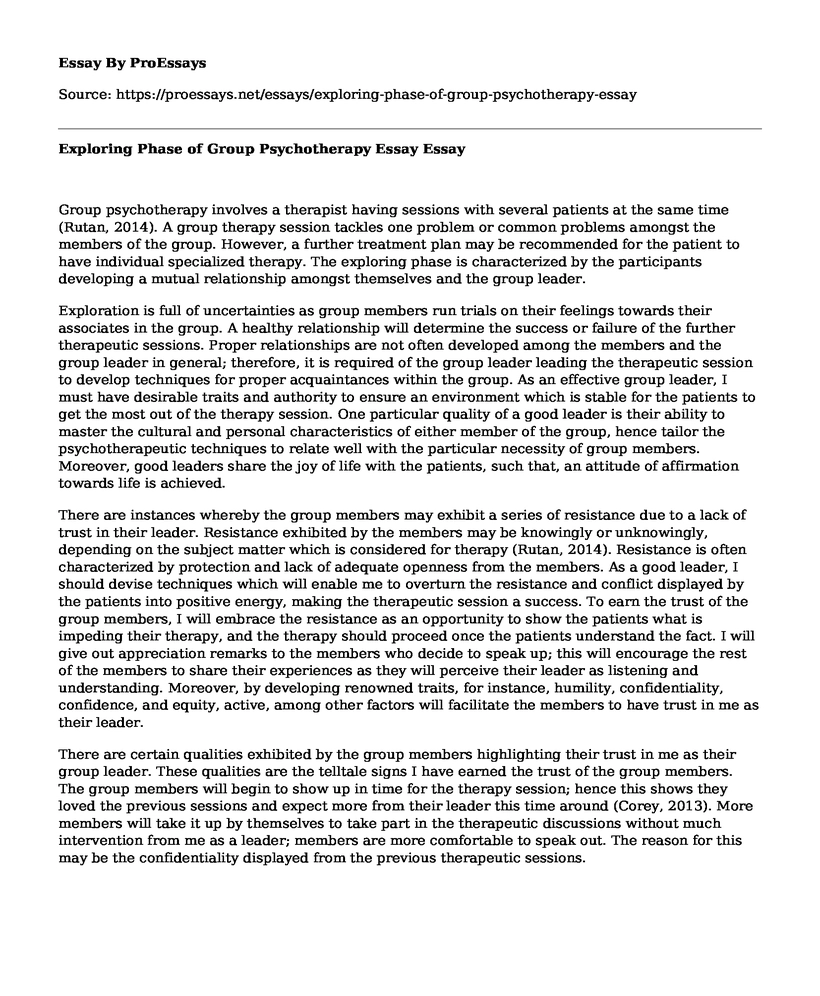Group psychotherapy involves a therapist having sessions with several patients at the same time (Rutan, 2014). A group therapy session tackles one problem or common problems amongst the members of the group. However, a further treatment plan may be recommended for the patient to have individual specialized therapy. The exploring phase is characterized by the participants developing a mutual relationship amongst themselves and the group leader.
Exploration is full of uncertainties as group members run trials on their feelings towards their associates in the group. A healthy relationship will determine the success or failure of the further therapeutic sessions. Proper relationships are not often developed among the members and the group leader in general; therefore, it is required of the group leader leading the therapeutic session to develop techniques for proper acquaintances within the group. As an effective group leader, I must have desirable traits and authority to ensure an environment which is stable for the patients to get the most out of the therapy session. One particular quality of a good leader is their ability to master the cultural and personal characteristics of either member of the group, hence tailor the psychotherapeutic techniques to relate well with the particular necessity of group members. Moreover, good leaders share the joy of life with the patients, such that, an attitude of affirmation towards life is achieved.
There are instances whereby the group members may exhibit a series of resistance due to a lack of trust in their leader. Resistance exhibited by the members may be knowingly or unknowingly, depending on the subject matter which is considered for therapy (Rutan, 2014). Resistance is often characterized by protection and lack of adequate openness from the members. As a good leader, I should devise techniques which will enable me to overturn the resistance and conflict displayed by the patients into positive energy, making the therapeutic session a success. To earn the trust of the group members, I will embrace the resistance as an opportunity to show the patients what is impeding their therapy, and the therapy should proceed once the patients understand the fact. I will give out appreciation remarks to the members who decide to speak up; this will encourage the rest of the members to share their experiences as they will perceive their leader as listening and understanding. Moreover, by developing renowned traits, for instance, humility, confidentiality, confidence, and equity, active, among other factors will facilitate the members to have trust in me as their leader.
There are certain qualities exhibited by the group members highlighting their trust in me as their group leader. These qualities are the telltale signs I have earned the trust of the group members. The group members will begin to show up in time for the therapy session; hence this shows they loved the previous sessions and expect more from their leader this time around (Corey, 2013). More members will take it up by themselves to take part in the therapeutic discussions without much intervention from me as a leader; members are more comfortable to speak out. The reason for this may be the confidentiality displayed from the previous therapeutic sessions.
Conclusion
The exploring phase is tentative, whereby; the members try to identify with their new environment with the aim of developing a proper relationship amongst themselves and their leader. Therefore, one particular role as a good leader should be able to bring cohesion through structuring amongst the group members to build confidence for the subsequent therapeutic sessions, as they are confused and anxious (Treatment, 2018). I can implement structuring through the development of structured question, whereby, members will speak out their fears hence develop confidence in themselves.
References
Corey, G. (2018). Theory & Practice of Group Counseling (9th ed.).
Rutan, J. (2014). Psychodynamic Group Psychotherapy. The Guilford Press.
Treatment, C. (2018). 6 Group Leadership, Concepts, and Techniques. Retrieved from https://www.ncbi.nlm.nih.gov/books/NBK64211/
Cite this page
Exploring Phase of Group Psychotherapy Essay. (2022, Aug 15). Retrieved from https://proessays.net/essays/exploring-phase-of-group-psychotherapy-essay
If you are the original author of this essay and no longer wish to have it published on the ProEssays website, please click below to request its removal:
- Lifespan Development: Adolescence
- High Inpatient Readmission Rates for Persons with Schizophrenia Patients: A Critical Issue in Mental Healthcare
- Existential Therapy Essay Example
- Essay Example on Drug Addiction: A Long-Term Mental Disorder
- Essay on My Objectivist Beliefs: How Self-Interest, Reason, Capitalism, and Reality Unify
- Paper Example on Sensory Experience & Customer Loyalty: Analyzing Factors Correlating to Loyalty
- Walter Reed Psychological Center: Multidisciplinary Behavioral Health Care in San Diego - Report Example







